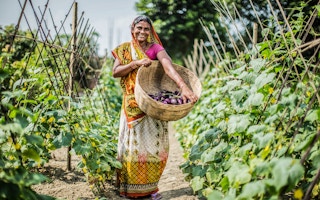FAO is entering an innovative strategic partnership with Unilever aimed at helping countries in their efforts to reduce food loss and waste and tackle climate change, in the context of the Sustainable Development Goals (SDGs).
FAO Director-General José Graziano da Silva and Paul Polman, chief executive of Unilever and SDG Advocate, signed a Letter of Intent to help ensure better access to food and the promotion of sustainable agriculture, in New York, in the margins of the United Nations General Assembly.
“FAO is excited to partner with Unilever. Fulfilling the 2030 Agenda for Sustainable Development requires commitment and action. Through this alliance, we will be able to positively impact the lives of family farmers and consumers and advance towards more sustainable production and consumption,” Graziano da Silva said after the meeting with Polman at the FAO New York Office.
The FAO Director-General also invited the CEO of Unilever to continue the high-level dialogue with a follow up meeting at FAO in Rome.
“
Through this alliance, we will be able to positively impact the lives of family farmers and consumers and advance towards more sustainable production and consumption.
José Graziano da Silva, director-general, UN FAO
Five key ambitions
The collaboration between FAO and Unilever is geared to pursue five strategic points of intervention, including digital innovation, land governance and resilience building for smallholder farmers as well as climate change and food loss and waste.
The alliance will cover countries throughout the globe, starting with Latin America, and is part of FAO’s Strategy for Partnerships with the Private Sector to achieve core Sustainable Development Goals.
FAO has already teamed up with Unilever in Argentina - where it is estimated that more than one kilogram of food is lost per person per day - in an example that will serve as a global initiative for wider application.
Unilever - which has committed to halving food waste by 2025, agrees to work with FAO to launch joint initiatives to reduce food loss and waste through awareness-raising campaigns, involving governments, civil society and the private sector.
Climate change and agriculture
Joint advocacy platforms will also be developed in the climate change arena, including in the context of the Conference of the Parties (COP) to the United Nations Framework Convention on Climate Change (UNFCCC). Together, FAO and Unilever will support efforts advancing the discussion on climate change and agriculture.
Unilever’s digital strategy for sustainable agriculture, centered on delivery of information, transactional and advisory services through mobile technology, aligns with FAO’s vision to increase rural incomes. It also presents an opportunity to jointly explore how to develop innovative digital solutions to reach small holders and family farmers.










